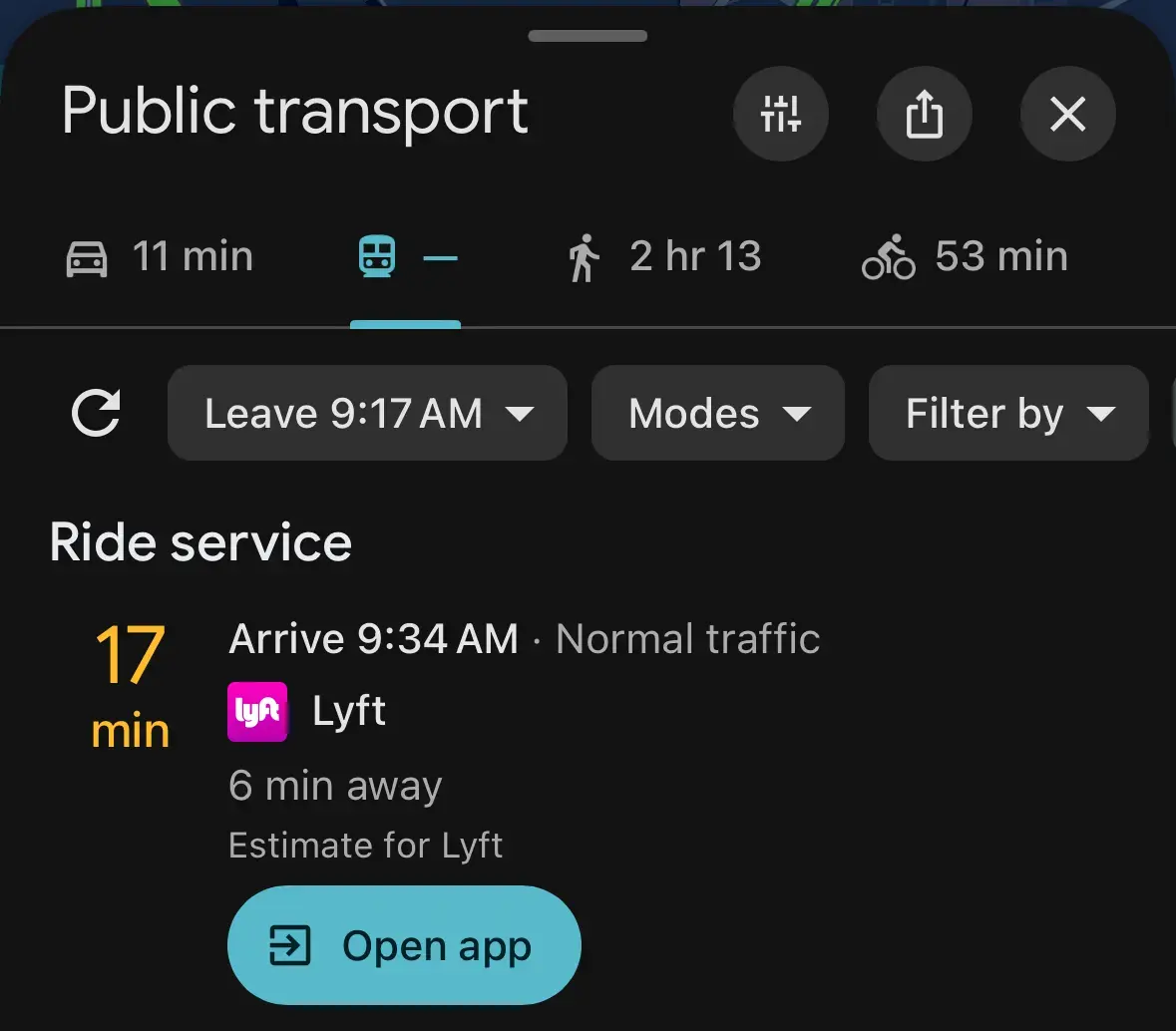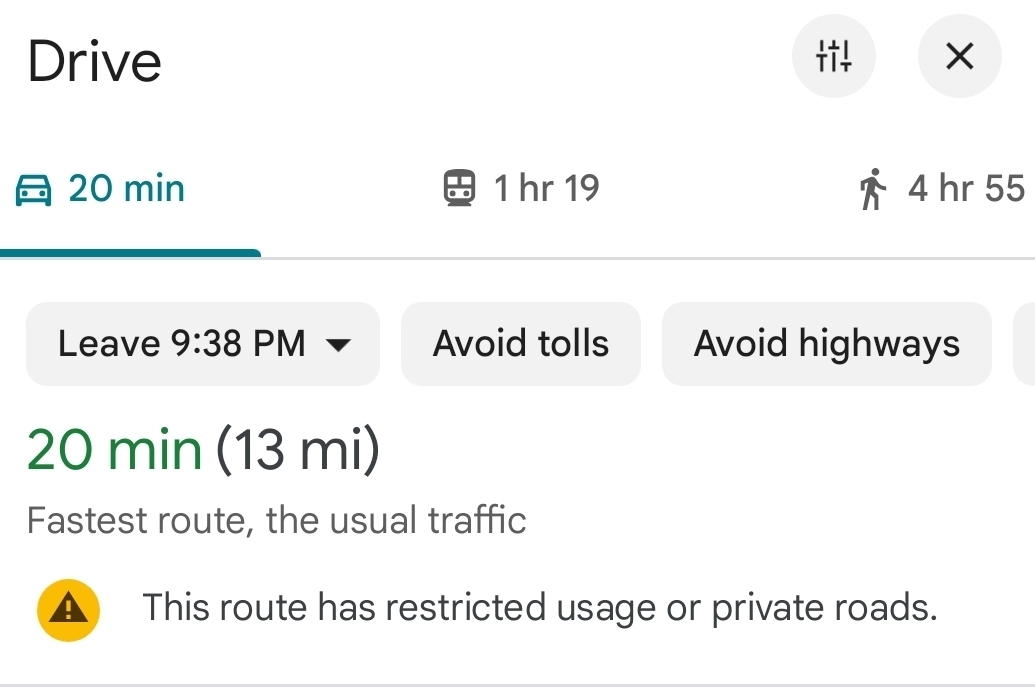Genuine Question. Even if I look at hungarian Transport, and they to this day use trains from the UdSSR, they come more consistantly then the DB.
They are really Bad sometimes, with like 20 seperate prices: Theres the bayernwald ticket that only works in the alps, then theres the official ticket to the destination. Theres a special offer, but only in the very special APP. You can use a d-ticket, but look! Some random ass slum in the middle of the worlds ass dosent accept that, but it does the MVV zone Tickets. But then you need the MVV zone 11-M, a ticket to the beginning to the Nürnberg zones, and a ticket for the Nürnberg zones.
And yet this shit is better than americas rails? How?
Lmao what public transport? We don’t have that here.
Really? Like… How do you move around then? Only cars? But if you dont want / have a car? If youre still doing your drivers license?
Fuck you, that’s how. It’s pretty much only cars. Not having a car isn’t really an option here, unless maybe you live in the heart of a big city.
A big city not in the South. Houston and Dallas are #4 and #9. There’s public transit but it fucking sucks both places.
* Big cities are limited to NYC, Chicago, and Washington DC.
I think Boston’s is pretty extensive as well, but that’s more of a mid-sized city and the infrastructure is certainly older
In many places it’s illegal to walk on the side of the road for motorist safety, and no they don’t see value adding sidewalks. Other places don’t like people that’s not from that area walking in front of their house and will call the police every single time.
Outside of like NYC you have a car. It’s a bad system economically, ecologically, and socially, but many people are kind of stupid and reactionary. You show them how putting in a bike lane and adding a bus stop will lower car traffic, improve air quality, and increase economic activity and they just go “no because I feel so”. Or, “one time I had to move a refrigerator so we need to prioritize large privately owned vehicles”.
We do have it in Germany and the local public transport is perfectly good, albeit a bit expensive in some cities, but its the interregional, long distance train network that has massive issues in Germany. Trains are constantly delayed or even cancelled, pricing is absurd, still no level boarding on the high speed trains, etc.
Where I live, you can drive across town in 30 minutes. I once worked with a coworker who lived about a 15min drive from work (less than 8km), and it consistently took him 2 hours to get to work by bus.
When I worked two jobs, I’d take the bus from one to the other and it would always take like an hour and a half. One day I decided to walk it, cause it was only a couple miles (also cause the bus driver straight up passed right by me while I was sitting on the bus stop bench waiting for them), maybe a little more than a mile and a half. Took me 45 minutes, maybe.
It’s not that alien is it? People rely on cars pretty heavily in most smaller towns in Germany.
Not German, but close enough - there’s usually at least one bus within walkable distance, even if it’s only like 4 times a day or something, that connects to a larger hub.
I lived in a place where I had to be by the bus stop at 7h30. If I missed that I’d have to wait for the next at 8h15, and if I missed that one, I’d better call to say I wasn’t able to go that day.
However, in smaller towns and in the countryside, with no cars, life is so different to the frenetic chaos of big cities that it’s hard to put into words.
I would imagine they all have busses? All rural areas in Scotland do at least.
And rural areas tend to be situated around villages with main streets - rather than random houses built outwards.
Dont know, I live in a pretty walkable City where I can bike in 5 Minuten from one end to the other, with a tech store, School, Beach, Bank, etc. Everything you would need. I have a train coming hourly if I want to go to the Beach or munich, but its admittadly way worse (20-30 mins) to bike to the next bigger City.
Last time I visited the Netherlands I thought I was in walkability heaven
Edit: shit, sorry. Forgot you said Germany… But my comment still stands, although I bet Germany is at least as nice as well.
We aren’t just talking small towns though. Any city that isn’t New York, Chicago, or Boston might as well not have any rail service at all. Houston has 22.7 miles of passenger railway that is only located downtown. Columbus Ohio has a metro of 2.2 million people and doesn’t have a single inch of passenger rail. Cleveland has an OK system by American standards, which i use whenever i go to Cleveland, but the only option for me to take a train into Cleveland from where i live in NW Ohio would take an hour longer than just driving there outright.
Most cities have a bus service, but they only rarely connect to smaller towns (“smaller” being relative here, like 30,000 people).
To put it in perspective, I live in a suburban apartment outside of a medium-sized city in Ohio. There is a single busline that goes through my neighborhood (which thankfully has a stop right outside my complex). A bus comes by once an hour between 7 AM and 7 PM.
This can get you to work if you’re lucky enough to work a 9-5 next to a bus stop. My work has a bus stop, but I work a 4-12, so no luck.
My favorite bar is in the next town over, a college town about 15 minutes down the road. If I wanted to get there by public transit, I would need to wait for the hourly bus outside of my apartment, get off at a grocery store, wait about a half an hour for a connecting bus from the college town’s bus service, and that’s not even counting the drive time.
And if I don’t leave the bar by 6 PM, of course, I’m stranded without an Uber or something, because even on weekends (not that I have weekends off work) the busses only run till 7 PM.
And there’s other towns nearby that I literally cannot take public transport to. I had to work an event in a smaller city (but still probably within the top 20 in the state for population) about half an hour drive away. There is no bus service that connects me to them. The only options are driving or Uber.
Its almost like you’re taking the piss
Cars only
Public transportation in cities varies. But inter-city transportation? In most of the USA you simply cannot travel between towns or cities on public transportation. There are a few inter-city bus options (Greyhound, Flix, Megabus), but those don’t go everywhere.
The rail options outside of the NE corridor (Boston to Washington DC, basically) are very sparse. Here’s the map: https://www.amtrak.com/content/dam/projects/dotcom/english/public/documents/Maps/Amtrak-System-Map-020923.pdf
That’s it. Most of those routes are at most once per day in each direction. So if you city even has a stop (which it probably doesn’t) the train may only come through in the middle of the night. Some routes are only 3x/week. And because of the massive distances involved and old equipment, it takes at least 70h+ to travel from coast to coast (more really, since connection times are long) and costs twice the price of a 6h flight ($250+ vs $80-120).
Trains are often on schedule, but can be many hours late. Once they are off schedule they are at the mercy of the freight train lines (who own the tracks) for passing. You can get stuck behind a slow moving cargo train for many hours.
Why is it like this? It’s complicated. But it starts with very low population density, large areas/distances, and a very different relationship between the individual and the state in the US vs most of Europe. Add the rise of suburbs in the automobile right when many US cities were growing. Another factor is public attitudes. People think that public transportation is for poor people. I know people who have never ridden a city bus, and I live in a city that probably has above average public transportation for the region.
Anyway, as a public transportation rider-by-choice I feel your pain. Having spent a few weeks in Germany recently (with a DT for travel), and having ridden extensively on US train and bus networks, yous is definitely much, much better. Resist the politics of privatization and decay.
Resist the politics of privatization and decay.
Too late. Railways have been converted to a public-private partnership in the 90s, and are trying to get broken up into a competitive market these days anyway, and local public transportation is also run by public-private companies. In the countryside, it’s usually managed by a private company in the first place, often organized in local organizations of several firms that offer the same fares - which usually has hard borders and can for example lead to villages next to each other having a 5 h connection time through railways, which don’t follow these area bounds.
If it exists, it is better than American public transit. Here is my daily commute to work, as estimated by Google Maps:

Even Google goes “lmao use a fucking car, peasant.”It’s technically possible for me to take public transit, but it would be about the same as walking. Here is a quick sketch of the route I’d need to take, compared to my drive:

That route is because there are no east/west lines between me and my job. It starts by walking/riding my bike the wrong direction to get to the nearest bus stop. Then it takes me south-west through two cities, then north-west through two more cities. Then I’d have a ~20 minute walk to transfer rail lines, because my job is serviced by a different rail system than the one that my bus service touches. After that walk (and waiting for the next train) I take it north and then have to walk another 10-15 minutes to finally get to work.
Not counting wait times, it would take me nearly 2.5 hours to use public transit. When you consider the fact that some busses and trains only run once every 20-45 minutes, it actually stretches closer to 3-4 hours, if the schedules don’t line up. Or I could just fucking drive 10 minutes. Yeah, it’s no wonder Americans use cars for everything.
USA.jpegright there. That image is for everyone who lives there except for like three cities. And the bike route is actually crossing several major roads.And the bike route is actually crossing several major roads.
It’s worse: The bike route is on a two lane highway with no shoulder. I’d be dead on Day 1 if I actually tried to walk/ride a bike.

My commute; this is a fun way to show how car centric America is lol
I used to just walk 1.5 hours to work sometimes because it was the same time the bus would take, to only drop me off 75minutes early for my shift, or ten minutes late. So I’d just walk.
“American public transport”
Good joke! Best joke I heard since “American democracy”!
Here’s a fun comparison: Tennessee vs Mecklenburg Western-Pomerania
They have very similar population density (70/km² vs 65/km²). Tennessee is roughly 4x the area and population.
There are only 2 inter-city train stops in Tennessee, in Memphis and a small town to it’s north, both on the 1x/day service between Chicago and New Orleans. The largest city (and its state capitol) Nashville has no rail service.
The entire state of Tennessee has only 10 inter-city bus stops. Ten! Serving 7M people. The 4th largest city in the state is Chattanooga (181k), and it has no inter-city bus and no rail.
American public transit doesn’t exist outside of a couple major cities.
So yeah. Probably the absolute worst Europe has to offer is a world altering step up.
Am American: this is correct
Yep. I’ve lived in 9 states so far. The only place I consistently used public transit was when I lived in NYC
American public transport
The what now?
I mean, it’s three words. You can put any two of them in a sentence. But not the third.
American Public? Public American?
Er, I think they mean:
American public (we exist)
Public transport (not much here)
American transport (cars)
I’m 30 years old and have taken a bus once in my entire life. Not because it sucks but because it’s simply nonexistent. I’d have to drive 30 minutes just to get to the place that had the public transport and at that point I might as well just drive all the way there. And I don’t even think the US has any trains that go between cities anymore except for commercial trains. I literally live next to a train track and it’s all cargo trains. I’ve never seen a passenger car on a train in my entire life. Could just be where I live, but I’ve driven from coast to coast and the only trains are cargo trains.
Not too long ago, I saw a map showing where each train is in USA. Someone also posted a similar maps from Switzerland. Can you guess which one had more trains?
What is public transport? I think we need to establish that first. You mean like…the school bus? That’s the only kind I’ve ever seen.
Kids get public transport, education, and sometimes even food
Old folks get walkable communities
College kids (at great expense) also do
The revealed preference is that we could have an excellent quality of life except for voters hating 18-65 year old adults
If americans come to germany and act like german public Transport is the best, how
frickin badnon-existent is american public Transport?FTFY. I was pretty blown away by it but I can get excited by a sidewalk.
Yeah I’m not sure if everyone realizes this. There’s all these states where there basically aren’t sidewalks outside of maybe small areas. Like entire miles and miles of residential areas with no sidewalks whatsoever.
I live in an area know for having some of the better public transport in the states. My drive to work is about 25 minutes. I can bus to work, but it takes almost three hours and three separate busses, and then I cannot bus home after work.
I live in an area that also has decent bus coverage with stops all over, although I’ve never actually taken the bus. I can’t take the bus to work because there aren’t stops where I need to go. I also attend school 19 miles away, and depending on traffic it’s anywhere from a 30-45 minute drive. Last year my car broke down and I looked into taking the bus to school for the few weeks I would be carless. It would have been a 5 1/2 hour trip each way, I would have had to take 3 or 4 buses, transfer between 2 different companies, and I would have had to walk several miles in between stops to get from the first bus company’s stop to the second’s. Realistically, I couldn’t have even left on time to make it to class or gotten back home while the buses were still running, even if I wanted to waste my life riding buses. I worked an extra 100 hours of OT that month to pay for my rental car.
America is owned and operated by rich people. They couldn’t make money running passenger trains so once we were ordered to invest in car-only infrastructure the trains were mostly disbanded and shut down. There’s a ghost of a system left with just a few corridors that could be considered bare minimum service in a developed nation.
How many kilometers of high speed rail does the US have? Zero. We have some that gets close, but not really.
My mid-sized city has two trains per day, one each direction, and they both leave between 1am and 2am. In Germany you would have 30+ trains per day in a city this size, likely a notable S-Bahn network, and also some trams and/or U-Bahns in the city to compliment busses. I’ve got busses in town, but they operated about every 30-45 minutes each, with evening service being every 60 minutes. Here’s the fun part: our busses are the most used public transit system for a mid-sized city in the US right now and it’s still pathetic when compared to even basic services in Europe.
DB needs to keep getting investment. Germany must get to a dedicated passenger rail network to separate out the freight trains. DB should also be re-nationalized and operated as a national service, not a for profit system that will inevitably fail as a commercial venture, leading to yet more terrible service. Here’s hoping the latest German Parliament follows through on investment money that they pushed through at the start of the year! Also, keep the Deutschland Karte! That’s such a great resource for everyone.
Its so bad its use is (wrongly) looked down upon as poor person transport unless its a large city. Everything is car culture and you are fucked without a car except in the largest metropolitan.
Shit does not run on time, its more expensive than it needs to be, and it goes very few places. It takes huge huge work to get it expanded because of NIMBYs and car companies fighting it.
Amtrak is doable but it takes as long or longer than driving a car.
There are no high speed trains and busses are a joke in cities. It can take hours to traverse a city because bus routes are terrible and constantly cut.
This is seriously all to do with car companies forcing out public transport in anyway possible as well as buying up a lot of city transportation portions and shutting them down as “not profitable”. Americans defend it because “public good” has been vilified here. Its so dumb.
Just to make this more explicit, I lived near a mall growing up. The mall actively fought against getting a bus stop put in near by. Why? Because if there is a bus stop near the mall, then, gasp, THOSE PEOPLE might come to the mall. And by those people, I think we all know I’m talking about.
Urban busses will be slower than driving in most situations since they have to stop every few blocks. That’s not really unique to the US. The exceptions are where there are BRT routes which can avoid commuter traffic, and this is becoming more common in the US but still lags behind the best European systems.
Only large, northeastern, US cities have anything resembling real public transportation.
















